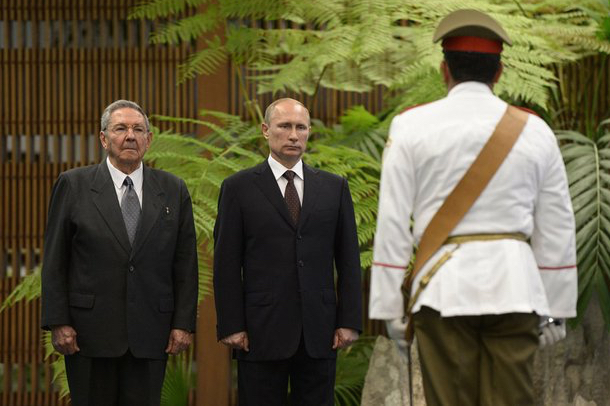
Obama’s Cuba Rapprochement: ‘Witches can be right, Giants can be good’
American musical theater composer Stephen Sondheim warns in this Christmas Day film release, Into the Woods, “Be careful what you wish for.” Could Sondheim’s parable be relevant in analyzing President Obama’s rapprochement with the Castro brothers? Is the policy change reflective of a pattern of geopolitical naiveté? Or, is it a well-timed move to exploit an opportunity sparked by the fall in crude oil prices? Could another Sondheim parable, “Opportunity is not a lengthy visitor” explain why Obama acted without warning?
Be careful of those in the Cuban exile community who wish for the immediate collapse of the Castro dictatorship. Imagine the result. The political vacuum that would be created by the collapse of the regime opens opportunities for the infiltration of drug cartels from Mexico and other forms of organized crime, terrorists from across the world, and many others that wish America harm. The alternative to such chaos would be a massive investment of American capital and military might to take political and economic control of Cuba and its 13 million citizens; an unrealistic option. Do not wish for a collapsed regime akin to an Iraq or Afghanistan 90 miles away from our border.
Americans must consider options like preventing threats to their national security. This approach explains why the United States welcomes thousands of Cubans each year and provides them with federal benefits.
Many of these recent arrivals, with federal benefits, return to Cuba as soon as they are able. And despite widespread criticism of the outdated Cuban Adjustment Act, welcoming Cuban economic émigrés is an appropriate policy to protect our national security. It is a relatively small economic investment to avoid the effects of a potentially chaotic downfall of the Castros.
Although President Obama could be criticized for his failure to obtain any concessions, what is in effect is a policy that Europe, Canada and others have pursued since the 1990’s, without success. Obama’s rapprochement may be a perfectly timed and brilliant move to exploit an opportunity by offering a lifeline to Castro’s collapsed economy.

Could President Obama be exploiting the opportunity sparked by the economic woes facing Cuba’s allies by avoiding a threat to our national security if there is a political vacuum in Cuba? Or is he positioning himself (possibly when Assistant Secretary of State Jacobson visits Cuba to negotiate the details) to demand some of the concessions suggested by Obama critics that would result in real positive change for the political and economic lives of the people of Cuba?
One could argue that if negotiations began 18 months ago, when the collapse of crude oil prices was unforeseen, Wednesday’s announcement is just one more example of his inexperience rather than a strategic decision that could, for the first time ever, put the United States in a position of negotiating strength vis-à-vis the Castros. Or is Sen. Marco Rubio correct in describing the President as the ” worst negotiator that we’ve had as president…” Did the Senator speak too soon?
Obama’s decision to act without warning, to the surprise of Congressional leaders and Cuban exiles, may be reflected in Sondheim’s parable “Opportunity is not a lengthy visitor.” Even though talks began 18 months ago, could it have been the crude oil market that sparked the maneuver?
Obama must now “wish” that crude oil prices remain low because unless the Castors “need” the United States economically, and Obama remains in a position to demand real reforms (e.g., human rights, unfettered internet access, direct employment, free and fair elections, access to new markets for U.S. exports and protection of U.S. investments and capital, return of convicted fugitives, etc.), Obama will again prove himself naïve, and fail. Obama would be in effect following the failed policy of the Europeans and Canadians that has not brought about any of the desired reforms, threated their investments, and resulted in the unjust imprisonment of many Europeans. Instead of leading, Obama would be “following” a failed policy.
Obama’s willingness to engage the Castros unconditionally could put American citizens and future investments at risk. In a regime controlled by emperors, conditions remain for more Alan Gross-type detentions. In their nearly 55-year history, the Castros have remained consistent: Never agree to concessions that diminish their hold of the country, its economy, or people. If President Obama believes that the Castros are negotiating in goodwill, then “Witches can be right, Giants can be good.” I wish….
